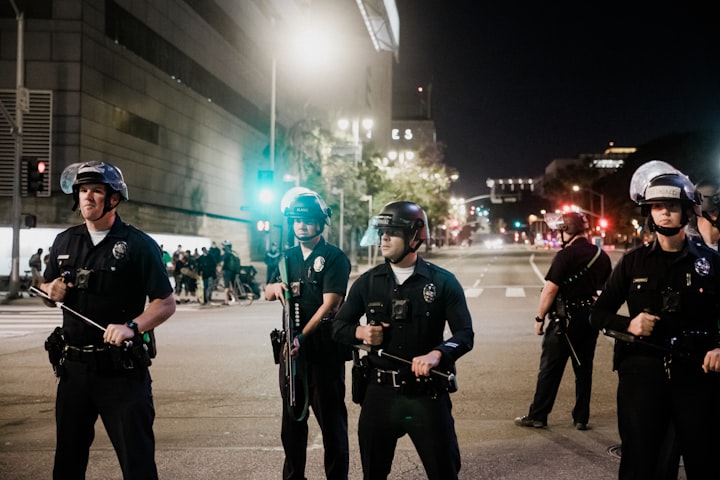I wrote a paper on white privilege and it’s correlations with police brutality in college. Here’s that paper.
In 2018 I was in an American literature class where we had to write about current topic and relate it to our class room topics. In this class we spoke a great deal about American slavery so I wrote about how systematic social cues that exclude minorities greatly affect the treatment received in high profile police brutality cases.
May 1 2018
The Correlation Between the Prevalence of White Privilege and Police Brutality in The United States of America.
Many American citizens have misconceptions of the definition of privilege. According to the Oxford dictionary white privilege is the “Inherent advantages possessed by a white person on the basis of their race in a society characterized by racial inequality and injustice (Oxford. par.1).” People who identify as white or white passing greatly benefit from white privilege because of institutionalized racism that prevails currently in modern society. This greatly harms our society by having a large disparity on how minorities are treated in a particular society. Benefiting from white privilege, at the expense of minority counterparts, for example having better odds at employment, and being chosen over for promotions and higher pay as well as facing lesser legal consequences in America is wrong and caused by unfair biases. This is a paramount matter because as was stated in the American constitution “All Men Are Created Equally” we as a populous should still be striving for this ideal. Minorities usually face longer prison sentences, and unequal legal disputes for the same crimes compared to White people, and it needs to be addressed. Another subset of these injustices is the much greater number at which minorities, especially young, black males are incarcerated and put to death by an armed force that has limited authority in doing so. This matters greatly, because no one should have to worry about survival based solely on the color of their skin and their socio-economic standing.
In John Scalzi’s “Things I Don’t Have to Think About Today” in the first few stanzas he states...
“Today I don’t have to think about whether store security is tailing me.
Today I don’t have to think about the look on the face of the person about to sit next to me on a plane. Today I don’t have to think about whether I’m being pulled over for anything other than speeding. Today I don’t have to think about being classified as one of “those people.” Today I don’t have to think about making less than someone else for the same job at the same place.”
For a poem that was written in the year 2010 means that in 8 years, there has been minimal progress on this topic. This work was also pre Black Lives Matter (BLM). BLM is an activist movement that regularly holds protests speaking out against police killings of black people, and broader issues such as racial profiling, police brutality, and racial inequality in the United States criminal justice system (Friedenshof). Black Lives Matter became a group in 2014 after George Zimmerman was acquitted for the murder of Trayvon Martin. This trial was also specifically addressed in a stanza from Scalzi’s work. As Trayvon Martin, a young black teenager was gunned down by neighborhood watchman George Zimmerman. As Martin was leaving a convenience store, Zimmerman who tailed Martin was acquitted, after stating that he feared for his life. A neighborhood watchman with a gun, versus a teenager with a can of ice tea and candy. Clearly this boy under all circumstances did not deserve to die that day. That being the genesis of this movement was vital in spreading awareness on a topic long pushed aside. Institutionalized racism is a very real, and extremely serious topic.
Michael Harriott, a journalist for “The Root” who writes on many black related topics, gathered very shocking evidence about how police brutality is affecting people in the United States. Harriott claims that in 2017 an astounding 1,129 people were killed by police brutality and roughly 37% of that number were unarmed Blacks and 27% armed Blacks (Harriott par.3). Harriott also goes on to define police brutality as an act of authoritarianism, which is a member of an armed force such as police officers who abuse their power to take extreme and unwarranted measures against a civilian. Police brutality has been a hot topic in the last few years because police officers are not facing the appropriate punishments for the slaughtering of innocent people. Many officers, who statistically, will be white males, often only face a paid leave, a possibility trial, and just a few sensitivity training courses. All while the victims and their families receive nothing. Many victims, who have lost their lives from police brutality were placed in their situations from either minor infractions and violations or from the police mistaken identity of the individual. Sandra Bland, an African American woman who was pulled over for a traffic violation was brutally dragged out her car, slammed on to a sidewalk and found dead in her cell three days later. The trooper who escalated a “failure of turning signal” traffic stop, Brian Encinia, opened Bland’s car door and arrested her. Bland, who states he has no right, angers him to the point that the man slams her to the ground. Provoked or not, the officer was in no mind to assault Bland. Encinia, as of 2018 had all charges dropped in exchange for his police license. A white man kills an innocent black woman, lies in all reporting of the incident, is found guilty of lying and serves zero jail time. The white privilege in the case is quite blatantly obvious. Encinia got away with murder.
Another case that highlights white privilege was the shooting of the South Carolina Church in Charleston. Jim Wallis the Author of “America’s Original Sin” recalls the event that happened “On June 17, 2015 a young believer of white supremacy invaded the sanctuary of African Methodist Episcopal Church...he sat with them, prayed with them and they welcomed him with open arms before he opened fire and killed nine people there at the prayer table. They were targeted and killed because they were black.(Wallis)” That is very difficult to confront. At a mere 21 years old Dylann Roof Slaughtered people because of racism. Roof later confessed that he committed the shooting in hopes of igniting a race war. Three days after the shooting, a website titled “The Last Rhodesian” that was owned by Roof contained photos of Roof posing with symbols of white supremacy and neo-Nazism, along with a manifesto in which he outlined his views toward blacks, among other peoples. Roof had every intention of hurting and killing people. Yet the police managed to arrest him without the use of excess force. That is where many of the concerns with police brutality come to light. Why was an unarmed women, who was a respected teacher slammed to the ground, arrest and murdered in her cell over a traffic stop and Roof a white man, armed, with over 30 counts of hate crimes, murder, primitive murder and so much more able to be captured and safely put in jail? The Sandra Bland case is not uncommon, escalation of traffic stops against people of color is a real concern for many Americans. Scalzi, was able to highlight this by saying he himself does not need to worry about that sort of thing because statistically as a white man he chances of dying from a routine traffic stop is minuscule.
Wallis put it best when he said,
“From Ferguson Missouri to Charleston South Carolina, communities are suffering the lethal consequences of our collective silence about racial injustice. We expect to little of law enforcement officials when we fail to hold them accountable for the misjudgments represented in the shooting deaths of so many unarmed people of color”
It hopes to inspire the conversation of collective action. To firstly deal with the unfair treatment of colored people by accepting that it exists in America. That a man like Philando Castile who was shot and killed by Jeronimo Yanez, a St. Anthony Minnesota, police officer, after being pulled over. Castile notified the officer he was armed and his wallet was near his arm the officer requested the identification, again fully aware of the situation and opened fire on Castile in his car with a total of three shots. Castile died 20 minutes later in the hospital and the officer walked free, acquitted from his trial. While a man like Brock Turner, the swimmer from Stanford University only had to serve six months of jail time for when he sexually penetrated an intoxicated and unconscious 22-year-old woman. Turner is an abuser and thanks to his affluence and white privilege he walks free able to hurt anyone else because he knows that consequences are minimal. Secondly, to proactively and consistently speak about it. The issues will only get better if we constantly talk with lawmakers and put pressure on law enforcement to better themselves. Society needs to acknowledge that it needs to be a better, more fair environment and that the color of your skin does not define you as a person. Works like Scalzi’s start the conversations that must continue because for many people in America, they do not have the luxury to simply wake up and not worry about social injustice. It is a conversation that Caucasian people need to be a part of as well. There is no, “I’m white so it doesn’t pertain to me”. We need people of color as much as we need white people to speak on these issues. Acceptance of white privilege makes even the smallest bit of difference in your daily life and you make it that much easier for a POC to get a piece of the socioeconomic pie. Change does not come from people who turn a blind eye. Change does not happen when those who can make a difference do not speak out. We must take action to improve the quality of life not just for ourselves but for those around us as well. To consistently challenge stereotypes and prejudices. We should all be striving for an America where we are judged by our ability and by our character then by the color of one's skin or by the sound of their name.
Works Cited
Abdullah, Melina. "WHAT THE BLACK LIVES MATTER MOVEMENT DEMANDS OF ETHNIC STUDIES SCHOLARS." Ethnic Studies Review, vol. 37-38, no. 1, 2017, p. 5+. Academic OneFile, http://link.galegroup.com.ezproxy.fgcu.edu/apps/doc/A525421432/AONE?u=gale15690&sid=AONE&xid=848bc6f1. Accessed 1 May 2018.
Friedersdorf, Conor. "Distinguishing Between Antifa, ...." The Atlantic. August 31, 2017. August 31, 2017.
Harriott, Michael, “Here’s how many people the police,..” The Roots January 2, 2018. https://www.theroot.com/heres-how-many-people-police-killed-in-2017-1821706614
Lee, Cynthia. "Making race salient: Trayvon Martin and implicit bias in a not yet post-racial society." North Carolina Law Review, June 2013, p. 1586+. Academic OneFile, http://link.galegroup.com.ezproxy.fgcu.edu/apps/doc/A337718469/AONE?u=gale15690&sid=AONE&xid=1589ea58. Accessed 1 May 2018.
Lowrey-Kinberg, Belen V., and Grace Sullivan Buker. "'I'm giving you a lawful order': dialogic legitimacy in Sandra Bland's traffic stop." Law & Society Review, June 2017, pp. 379-412. Academic OneFile, http://link.galegroup.com/apps/doc/A493668080/AONE?u=gale15690&sid=AONE&xid=504d92c8. Accessed 1 May 2018.
Oxford Dictionary. Unknown. “White Privilege Search results https://en.oxforddictionaries.com/definition/us/white_privilege Paragraph 1 Accessed 1 May 2018.
Scalzi, John “Things I Don’t Have to Think About” Whatever the Machine Mocks Facist https://whatever.scalzi.com/2010/10/18/things-i-dont-have-to-think-about-today/ Accessed 1 May 2018.
Wallis, Jim. “America's Original Sin” Sojourners Magazine. Feb2016, Vol. 45 Issue 2, p16-19. 4p.
Word Count
Pages 8
Words 1919
Characters 11468
About the Creator
Maria Sanchez
A fan of literature and art. Collector of tea cups that have gone cold, stained paintbrushes, and memories of this precious life.
If you wanna change the word, change yourself.







Comments
There are no comments for this story
Be the first to respond and start the conversation.